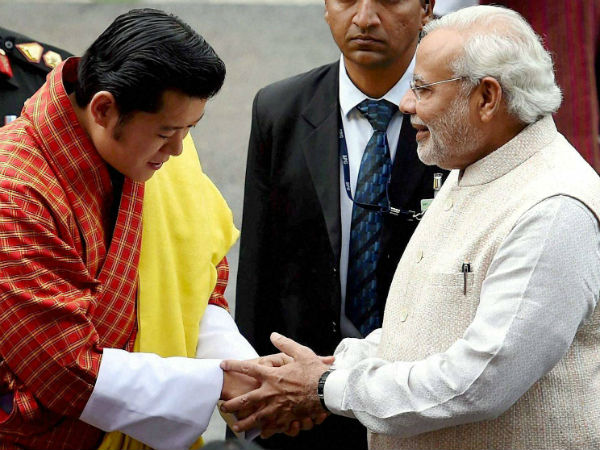Context:
Foreign Secretary Vinay Kwatra visited Bhutan for a three-day visit after the appointment ceremony of Bhutan‘s new Prime Minister Tshering Tobgay.
Outcomes of the visit:
- Talks in Bhutan covered bilateral ties, the ‘Mindfulness City’ project, border discussions with China, and an invitation for PM Tobgay to visit India.
- Bangladesh Foreign Minister Mahmud’s February 7 visit will address connectivity, rail projects, electric buses, border security, and Rohingya issues.
- External Affairs Minister S. Jaishankar will attend the Indian Ocean Conference in Perth, Australia, where discussions with various regional leaders are anticipated.
- India and Pakistan exchanged assignment visas for diplomats, diplomatic staff, and family members to serve at each other’s High Commissions. This comes a week before elections in Pakistan on February 8.
- A “high-level core group” delegation from the Maldives is expected to visit Delhi in February to discuss issues, including the demand for India to withdraw all military personnel from the archipelago by March 15.
India- Bhutan Relations
Historical
- Diplomatic relations between India and Bhutan began in 1968 with the appointment of a resident representative in Thimphu.
- Before 1968, relations were managed by the Political Officer in Sikkim.
- The cornerstone of India-Bhutan relations is the treaty of friendship and cooperation signed in 1949, further renewed in February 2007.
Political
In August 2019, PM Shri Narendra Modi’s visit to Bhutan marked the initiation of four significant bilateral projects.
- It included the launch of the 720 MW Mangdechhu Hydroproject, the establishment of the Ground Earth Station of ISRO for utilizing the South Asian Satellite, the introduction of RuPay Card, and the extension of interconnection between India’s National Knowledge Network and Bhutan’s Research and Education Network.
The 4th India-Bhutan Development Cooperation talks on January 2023 in Thimphu to oversee the progress of various projects.
Economical
- The India-Bhutan Agreement on Trade, Commerce, and Transit, first signed in 1972 and revised in 2016, establishes a free trade regime.
- Since 2014, India’s merchandise trade with Bhutan has nearly tripled, reaching USD 1422 million in 2021-22, accounting for about 80% of Bhutan’s overall trade.
- India constitutes 50% of Bhutan’s total FDI, making it the leading source of investments in the country.
- Over 800 projects are currently underway, representing 73% of Bhutan’s external grant funding.
Defence
- A 2000-strong Indian Military Training Team (IMTRAT) is stationed in western Bhutan, providing continuous training support to the Royal Bhutan Army
- The Indian Air Force provides air defence cover to Bhutan, with RBA pilots being trained in India.
Hydropower Cooperation
- Bhutan generates significant revenue from hydropower exports to India.
- Four operational projects supply 2136 MW of electricity to India.
Educational
- Over 950 annual scholarships provided by the Government of India for Bhutanese students in diverse fields like medicine and engineering.
- Around 4,000 Bhutanese students self-finance their undergraduate studies in Indian universities.
Cultural and Buddhist links
- Bhutanese pilgrims frequently visit Buddhist sites in India, including Bodh Gaya, Rajgir, Nalanda, Sikkim, and Udayagiri.
Indian Diaspora
- Estimates suggest around 50,000 Indian citizens reside in Bhutan, primarily concentrated in urban areas like Thimphu, Phuntsholing, and Gelephu.
Bhutan’s Importance for India
- Buffer State: Bhutan serves as a crucial buffer state between India and China, safeguarding the “Chicken Neck” corridor. This strategic location provides defense against potential threats and enhances India’s security.
- Countering China’s Influence: Bhutan’s close ties with India act as a counterweight to China’s expanding influence in the region, contributing to regional stability.
- Hydropower Projects: Bhutan’s hydropower projects contribute significantly to India’s energy security. Ongoing and upcoming projects further solidify this economic partnership.
- Shared Heritage: Deep cultural and historical ties between India and Bhutan, including shared values and religious practices, foster a sense of friendship and understanding.
Challenges between India and Bhutan
China’s Growing Influence: India is increasingly concerned about China’s expanding economic and political footprint in Bhutan. Ongoing border disputes and potential shifts in Bhutan’s diplomatic autonomy could pose challenges to India’s strategic influence in the region.
Infrastructure Development Challenges: Bhutan’s mountainous terrain and environmental considerations present obstacles to large-scale infrastructure projects, impacting economic development and the benefits of Indian assistance.
Lack of Transparency and Communication: A lack of Transparency and open communication between the two governments can lead to misunderstandings and mistrust, highlighting the need for enhanced diplomatic dialogue and cooperation.
Shifting Dynamics in Bhutan:
- Bhutan’s growing political maturity and desire for greater diplomatic autonomy might lead to some divergence from India’s strategic interests.
- Bhutan’s dependence on Indian aid and trade creates an uneven power dynamic, potentially hindering economic diversification and self-reliance.
- Bhutan’s unresolved border disputes with China pose potential security risks for both Bhutan and India.
External Challenges:
- China’s Influence: China’s increasing economic and political engagement in Bhutan raises concerns about potentially diminishing Indian influence in the region.
- Water Resource Management: Shared water resources, particularly rivers flowing into India, can be a source of contention, requiring careful management and cooperation.
- Regional Security: The rise of other regional player like Nepal and Bangladesh, and their potential alliances, can influence the India-Bhutan dynamic.
Neighbouring Countries Dimension:
- Nepal: Nepal’s geographical proximity and historical ties with both India and Bhutan create a complex geopolitical landscape. Political instability in Nepal can spill over into the region, affecting India-Bhutan relations.
- Bangladesh: Bhutan’s landlocked status makes Bangladesh a crucial trade partner. However, border disputes and issues related to cross-border migration can strain relations.
- Myanmar: Myanmar’s recent political turmoil and ongoing humanitarian crisis could indirectly impact the India-Bhutan relationship, particularly regarding security cooperation.
Way Forward
- Forge a resilient defence for Bhutan by deepening military ties with India and seeking diverse partnerships for long-term security.
- Collaborate for mutual prosperity by jointly tackling shared challenges, fostering understanding, and building a harmonious and thriving future.
- Strengthening Strategic Cooperation would enable both nations to address common security concerns, collaborating against terrorism, drug trafficking, and transnational crimes.

